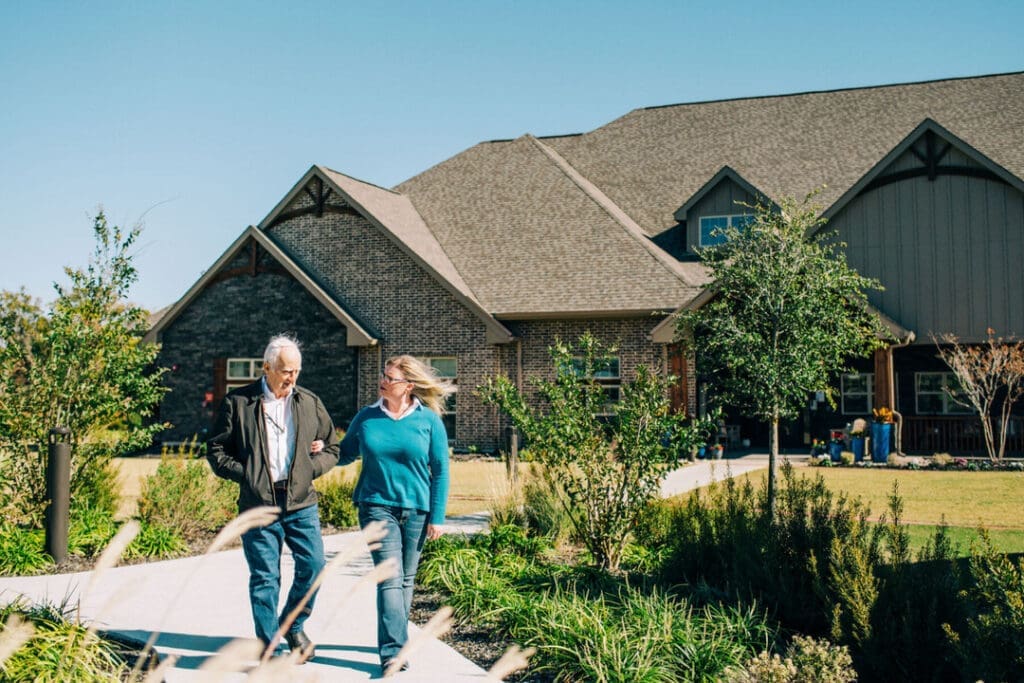What Is Dementia?
“Dementia is a general term for loss of memory, language, problem-solving and other thinking abilities that are severe enough to interfere with daily life. Alzheimer’s is the most common cause of dementia.” – Alzheimer’s Association
Understanding Dementia and Memory Care Options
“Your loved one has dementia (or Alzheimer’s Disease)” is a phrase none of us want to hear.
Yet statistics tell us, that as the Silent Generation and now the upper end of the Baby Boomers reach their upper 70’s (Boomers) and 80’s/90’s (Silents), many more of us will hear that.
One in three seniors dies with Alzheimer’s Disease or another dementia. More than 6 million Americans have Alzheimer’s Disease today and that is expected to double in the coming years (as the Baby Boomers age). The number one predictor is age – the number of people living with Alzheimer’s Disease doubles every 5 years after age 65 (so the older you get, the higher your chances).
The thought of Memory Care strikes fear into the hearts of many, and that is understandable given the realities of how dementia progresses.
It is scary to think of your loved one no longer being able to safely live at home or in an assisted living environment. It is scary, in part, because you realize you are losing them and no one is ready for that.
A Personal Journey
Godwin Dixon shares his personal experience of watching his mother, a brilliant woman with a Ph.D., lose her cognitive abilities.
“I remember the day when my mother no longer made sense. The face and voice that had always been a constant in my life no longer added up. She held a Ph.D. and was brilliant, but that brilliance had faded. As someone deeply involved in senior care, I couldn’t afford the luxury of denial. I knew there was no coming back from this.
My incredibly competent mom was gone. Physically, she was still present. We could chat, we could laugh, we could reminisce – but her ability to make sound decisions was slipping away right before my eyes.
Mentally, I had to make a switch from being just a son to becoming her caregiver because being her son was tearing my heart apart. She could no longer be the mom she had always been, and her capacity to be there for me was rapidly diminishing.
So, I embraced the role of caregiver because it allowed me to focus on her needs, which were escalating as she lost the ability to care for herself.
Perhaps you are witnessing a similar journey in a loved one’s life. You might be observing it on the distant horizon, catching glimpses of it more frequently, or experiencing it in the here and now.
If your loved one has dementia, it’s a journey that awaits.”
The Growing Concern: Dementia Statistics
Facing the Reality
Revealing the Harsh Truths about Dementia
Receiving the diagnosis of dementia or Alzheimer’s Disease for a loved one is never easy. Unfortunately, as the Silent Generation and the Baby Boomers continue to age, this reality is becoming more common.
Here’s a sobering fact: One in three seniors will pass away with Alzheimer’s Disease or another form of dementia. Currently, over 6 million Americans are living with Alzheimer’s Disease, a number projected to double as the Baby Boomer generation advances in age.
The Fear of Memory Care
Understanding the Emotional Impact
The thought of Memory Care can be terrifying for families facing dementia. It’s understandable, given the relentless progression of the disease.
The idea of your loved one no longer being safe at home or in an assisted living environment is heart-wrenching, primarily because it means you’re gradually losing them.
Unveiling Dementia: What is Happening in the Brain
Defining Dementia
Understanding the Technicalities
Dementia, in technical terms, is a deterioration in intellectual functioning that significantly affects memory, thinking, and social abilities, disrupting daily life.
While there are over 130 forms of dementia, the result remains remarkably similar.
The Grim Reality
The Progressive and Irreversible Nature
In most cases, dementia means the brain is dying, and this decline is often progressive and irreversible. However, it’s essential to note that some reversible conditions can mimic dementia-like symptoms.
To distinguish between the two, it’s crucial to consult with a qualified healthcare professional.
Recognizing Dementia Symptoms
Common Indicators
Identifying the Red Flags
Dementia presents itself through several common symptoms:
1. Memory Loss: Often noticed by others.
2. Poor Judgment: Examples include giving money to strangers or falling for scams.
3. Language Issues: Difficulty in finding the right words.
4. Personality Changes: Paranoia, loss of initiative, and more.
Beyond the Basics
Digging Deeper into Symptoms
It’s vital to look beyond these surface symptoms. If your loved one exhibits signs like getting lost while driving, deteriorating reasoning abilities, difficulty in learning new things, or confusion and disorientation, it’s time to take action.
Seeking Medical Guidance
The First Step
Visiting the Doctor
If you suspect your loved one is struggling with dementia symptoms, the initial step is not Memory Care—it’s visiting a doctor. Seek a thorough physical examination to rule out reversible issues.
Start with a skilled general practitioner, but for a definitive dementia diagnosis, consulting a neurologist with experience in dementia is recommended.
Importance of Diagnosis
Why a Competent Doctor Matters
Accurate diagnosis is critical to determine the appropriate treatment, whether it involves attempts at reversal, slowing progression, or managing the condition.
Reversible Conditions that Mimic Dementia
Addressing Underlying Issues
Conditions that Can Be Treated
Several conditions can mimic dementia-like symptoms but are treatable:
1. Depression: Untreated severe depression can lead to dementia-like symptoms.
2. Tumors: Some tumors are treatable and can cause dementia-like symptoms if left unchecked.
3. Normal Pressure Hydrocephalus: Excessive brain pressure can mimic dementia but is treatable when addressed early.
4. Subdural Hematoma: Immediate treatment is crucial to prevent irreversible damage.
5. Alcohol and Drug Damage: These substances can harm the brain, but quitting may allow for recovery.
6. Sleep Deprivation: Lack of sleep can lead to dementia-like symptoms.
7. Hypothyroidism: Low thyroid hormone levels are treatable.
8. Dietary Disorders: Vitamin B12 deficiency is treatable.
9. Infections: UTIs, if left untreated, can mimic dementia. Swift and effective treatment is essential.
The Four Most Common Forms of Dementia
Understanding the Types
Dementia comes in various forms, but the four most common are:
1. Alzheimer’s Disease: The most well-known and prevalent form, characterized by a progressive decline in memory and cognitive abilities. It is always fatal.
2. Lewy Body Dementia: Noted for the presence of unusual cells in the brain, leading to symptoms like falls, delusions, and insomnia.
3. Frontotemporal Lobe Dementia: This type involves damage to the frontal and temporal lobes of the brain, leading to impulsivity and behavioral problems.
4. Vascular Dementia: Caused by a loss of blood flow to the brain, often due to strokes or other vascular issues, resulting in unpredictable symptoms.
Conclusion
Dementia is a challenging journey, and understanding its complexities is the first step towards providing the best care for your loved one.
In Part II of “Dementia – What You Need to Know,” we will delve deeper into care options, resources, and ways to support both individuals with dementia and their families.
We invite you to experience why Teresa’s House is a truly exceptional and caring place catering to our residents and providing peace of mind for their families.
Schedule a tour of Teresa’s House today to find the perfect home for your loved one.
> Click here to read Dementia – What You Need To Know Part 2



